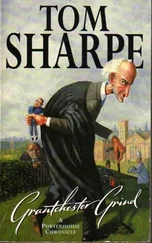His anger, unlike the Dean’s, was tainted with a sense of betrayal. The College whose servant he was and his ancestors before him had let him down. They had no right to let Sir Godber sell Rhyder Street. They should have stopped him. That was their duty to him, just as his duty to the College had been for forty-five years to sit in the Porter’s Lodge all day and half the night for a miserable pittance a week, the guardian of privilege and of the indiscretions of the privileged young. How many drunken young gentlemen had Skullion helped to their rooms? How many secrets had he kept? How many insults had he suffered in his time? He could not begin to recall them but in the back of his mind the debits had balanced the credits and he had been secure in the knowledge that the College would always look after him now and in his old age. He had been proud of his servility, the Porter of Porterhouse, but what if the College’s reputation was debased? What would he be then? A homeless old man with his memories. He wasn’t having it. They’d got to see him right. It was their duty.
In the library at Coft Castle, the Dean put the same point to Sir Cathcart.
“It’s our duty to see these damnable innovations are stopped,” he said. “The man seems intent on changing the entire character of the College. For years, damn it for centuries, we’ve been famous for our kitchens and now he’s proposing a self-service canteen and a contraceptive dispenser.”
“A what?” Sir Cathcart gasped.
“A contraceptive dispenser.”
“Good God, the man’s insane!” shouted Sir Cathcart. “Can’t have one of those damned things in College. When I was an undergraduate you got sent down if you were caught riveting a dolly!”
“Quite,” said the Dean, who had a shrewd suspicion that in his time the General had been a steam-hammer if the imagery of his language was anything to go by. “What you don’t seem to appreciate, Cathcart,” he continued, before the General could indulge in any further mechanical memories, “is that the Master is undermining something very fundamental. I’m not thinking simply of the College now. The implications are rather wider than that. Do you take my meaning?”
Sir Cathcart shook his head. “No, I don’t,” he said bluntly.
“This country,” said the Dean with a new intensity, “has been run for the past three hundred years by an oligarchy.” He paused to see if the General understood the word.
“Quite right, old boy,” said Sir Cathcart. “Always has been, always will be. No use denying it. Good thing.”
“An elite of gentlemen, Cathcart,” continued the Dean. “Now don’t mistake me, I’m not suggesting they started off as gentlemen. They didn’t, half of them, they came from all walks of life. Take Peel for instance, grandson of a mill hand, ended up a gentleman though, and a damned fine Prime Minister. Why?”
“Can’t think,” said Sir Cathcart.
“Because he had a proper education.”
“Ah. Went to Porterhouse eh?”
“No,” said the Dean. “He was an Oxford man.”
“Good God. And still a gentleman? Extraordinary.”
“The point I’m trying to make, Cathcart,” said the Dean solemnly, “is that the two Universities have been the forcing-house of an intellectual aristocracy with tastes and values that had nothing whatever to do with their own personal backgrounds. How many of our Prime Ministers over the last hundred and seventy years have been to Oxford or Cambridge?”
“Good Lord, don’t ask me,” said the General. “Got no idea.”
“Most of them,” said the Dean.
“Quite right too,” said Sir Cathcart. “Can’t have any Tom, Dick or Harry running the affairs of state.”
“That is precisely the point I have been trying to make,” said the Dean. “The business of the older Universities is to take Toms and Dicks and Harrys and turn them into gentlemen. We have been doing that very successfully for the past five hundred years.”
“Mind you,” said Sir Cathcart doubtfully, “I knew some bounders in my time.”
“I daresay you did,” said the Dean.
“Used to duck ’em in the Fountain. Did them no end of good.” Sir Cathcart reminisced cheerfully.
“What Sir Godber proposes,” the Dean continued, “means the end of all that. In the name of so-called social justice the man intends to turn Porterhouse into a run-of-the-mill college like Selwyn or Fitzwilliam.”
Sir Cathcart snorted.
“Take more than Godber Evans to do that,” he said. “Selwyn! Full of religious maniacs in my time, and Fitzwilliam wasn’t a college at all. A sort of hostel for townies.”
“And what do you think Porterhouse will be with a self-service canteen instead of Hall and a contraceptive dispenser in every lavatory? There won’t be a decent family prepared to pay a penny towards the Endowment Fund, and you know what that means.”
“Oh come now, can’t be as bad as that,” said Sir Cathcart, “I mean to say we’ve survived worse crises in the past. There was the business over the Bursar… what was his name?”
“Fitzherbert.”
“Enough to ruin another college, that was.”
“Enough to ruin us,” said the Dean. “If it hadn’t been for him we wouldn’t be dependent on wealthy parents now.”
“But we got over it all the same,” Sir Cathcart insisted, “and we’ll get over this present nonsense. Just fashion, all this equality. Here today, gone tomorrow. Have a drink.” He got up and went over to the Waverley Novels. “Scotch?” The Dean regarded the set in some bewilderment.
“Scott?” he asked. He had never regarded Sir Cathcart as a man with even remotely literary tastes and this sudden change in the conversation seemed unduly inconsequential.
“Or sherry? if you prefer,” said Sir Cathcart, indicating a handsomely bound copy of Lavengro . The Dean shook his head irritably. There was something extraordinarily vulgar about Sir Cathcart’s travesty of a library.
“ Romany Rye perhaps?” The Dean shook his head. “Nothing, thank you,” he said. Sir Cathcart helped himself to Rob Roy and sat down.
“Proust,” he said, raising his glass. The Dean stared at him angrily. Sir Cathcart’s flippancy was beginning to get on his nerves. He hadn’t come out to Coft Castle to be regaled with the liquid contents of the library.
“Cathcart,” he said firmly, “we have got to do something to stop the rot.”
The General nodded. “Absolutely. Couldn’t agree more.”
“It needs more than agreement to stop Sir Godber,” continued the Dean. “It needs action. Public pressure. That sort of thing.”
“Difficult to get any public sympathy when you’ve got undergraduates running round blowing up buildings. Extraordinary thing to do really. Fill all those contraceptives with gas. Practical joke I suppose. Went wrong.”
“Very wrong,” said the Dean, who didn’t want to get sidetracked.
“Mind you,” said Sir Cathcart, “I can remember getting up to some pretty peculiar pranks. When I first went in the Army, great thing was to fill a French letter with water and stick it down someone’s bed when he was out. Top bunk, you follow. Comes back. Gets into bed. Puts his toe through the thing. Fellow below gets drenched.”
“Very amusing,” said the Dean grimly.
“That’s only the beginning,” said the General. “Fellow Below thinks fellow on top has wet his bed. Gets up and clobbers him. Damned funny. Two fellows fighting like that.” He finished his whisky and got up to replenish his glass. “Sure you won’t change your mind,” he asked.
The Dean studied the shelves pensively. He was beginning to feel the need for some sort of restorative.
Читать дальше












